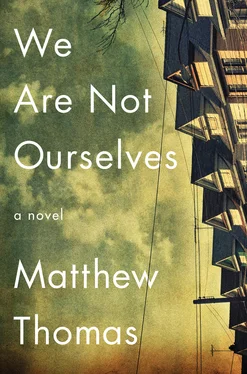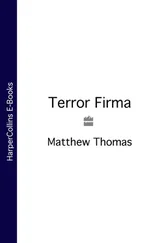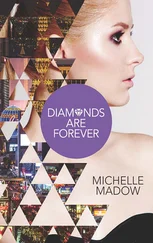And what did parents do? They saw more clearly than their kids did. They forgave their kids, even if they didn’t say so. Even if they couldn’t say so. They did.
He couldn’t wait to get home to his wife. She would be surprised by his change of heart. She might be more surprised by how much he had to say. She was always trying to get him to talk. Well, tonight he was going to talk. She wasn’t going to be able to shut him up. He was going to tell the whole story, even the parts he wasn’t proud of. He would have to find a way to tell it so it made some kind of sense. He would have to tell it from the beginning. He’d have to give her enough detail to let her see it for herself. It was lucky that he had such a good memory for that kind of thing. It was all in there somewhere, he was sure of that. He would dig it out.
He rose and walked to the fence that cordoned off the edge of the island. He took one last look at the little chip of tooth and tossed it in the water. It disappeared without even the tiniest detectable splash, to settle unseen on the riverbed. Maybe in a few thousand years it would make its way out to the ocean. Maybe in another few thousand it would wash up on the shore of a wholly different world, with new species, a different atmosphere, and a tenuous place for man. For now, while he breathed and moved, while he felt and thought, there was still, between this moment and the one of his dying, the interval allotted to him, and there was so much to live for in it: the citrus snap of fresh black tea; the compression and release of a warm stack of folded towels carried to the closet between two hands; the tinny resonance of children in the distance when heard through a bedroom window; the mouth-fullness of cannoli cream; the sudden twitch of a horse’s ear to chase a fly; the neon green of the outfield grass; the map of wrinkles in one’s own hand; the smell and feel, even the taste of dirt; the comfort of a body squeezed against one’s own.
He would hug his kid as much as he could. “Good,” he’d say. “Good. Good.”
For the titles of parts I, III, IV and V, I am indebted to The Great Gatsby, “Skunk Hour,” by Robert Lowell, “Love Song: I and Thou,” by Alan Dugan, and “Meditation at Lagunitas,” by Robert Hass.
Many thanks to: Stephen Boykewich, Aidan Byrne, Joshua Ferris, Chad Harbach, Christopher Hood, and Tracy Tong, for careful reads and useful notes; Aaron Ackermann, Bonnie Altro, Charles Bock, John James, Matthew McGough, David Moon, Bergin O’Malley, Brad Pasanek, Amanda Rea, Chris Wiedmann, and Boris Wolfson, for friendship, encouragement, and support; all my teachers, especially Tristan Davies, Eric DiMichele, Stephen Dixon, Judith Grossman, Michelle Latiolais, Alice McDermott, Jean McGarry, John Mullin, David Powelstock, Mark Richard, Jim Shepard, Malynne Sternstein, William Veeder, Michael Vode, Robert von Hallberg, Greg Williamson, and Geoffrey Wolff; my classmates at Hopkins and Irvine; the staff and community at Paragraph, where I wrote a substantial portion of this book; my beloved colleagues at Xavier High School, especially Margaret Gonzalez, Ben Hamm, Mike LiVigni, and the entire English department; my extraordinary agent Bill Clegg, along with Chris Clemans, Raffaella De Angelis, Anna DeRoy, and Elizabeth Sheinkman at WME; my brilliant editor Marysue Rucci, publisher Jonathan Karp, and so many others at Simon & Schuster, especially Elizabeth Breeden, Andrea deWerd, Cary Goldstein, Emily Graff, Jessica Lawrence, Christopher Lin, Carolyn Reidy, Richard Rhorer, Lisa Rivlin, and Wendy Sheanin; copyeditor Peg Haller; Clare Reihill at Fourth Estate; Caroline Ast at Belfond; Mickey Quinn, for sharing his memories with me; my sister Liz Janocha and brother-in-law John; my mother and father, for a lifetime of love and stories; and my wife, Joy, for her indispensable edits and remarkable forbearance in giving me time to write while we raised twin babies in a one-bedroom apartment.
This reading group guide for We Are Not Ourselves includes an introduction, discussion questions, ideas for enhancing your book club, and a Q&A with author Matthew Thomas. The suggested questions are intended to help your reading group find new and interesting angles and topics for your discussion. We hope that these ideas will enrich your conversation and increase your enjoyment of the book.
Epic in scope, heroic in character, and masterful in prose, We Are Not Ourselves is a multigenerational portrait of the Irish American Leary family.
Born in 1941, Eileen Tumulty is raised by her Irish immigrant parents in Woodside, Queens, in an apartment where the mood swings between heartbreak and hilarity, depending on whether guests are over and how much alcohol has been consumed.
When Eileen meets Ed Leary, a scientist whose bearing is nothing like those of the men she grew up with, she thinks she’s found the perfect partner to deliver her to the cosmopolitan world she longs to inhabit. They marry, and Eileen quickly discovers Ed doesn’t aspire to the same, ever bigger stakes in the American Dream. Although she encourages him to want more, as the years pass it becomes clear that his growing reluctance is part of a deeper psychological shift. An inescapable darkness enters their lives, and Eileen and Ed and their son Connell try desperately to hold together a semblance of the reality they have known and to preserve, against long odds, an idea they have cherished of the future.
Through the Leary family, novelist Matthew Thomas charts the story of the American Century. At once expansive and exquisitely detailed, We Are Not Ourselves is a riveting and affecting work of art — one that reminds us that life is more than a tally of victories and defeats, that we live to love and be loved, and that we should tell one another so before the moment slips away.
Topics & Questions for Discussion
1. Thomas begins his novel with two epigraphs, one from Stanley Kunitz and one from King Lear. Did the epigraphs inform your reading of the novel? How did they relate to each of the members of the Leary family? Why do you think Thomas chose to use the phrase We Are Not Ourselves , taken from the King Lear epigraph, as the title of his novel?
2. When Eileen is growing up, she’s aware that “men were always quieting down around her father”, whom “everybody called…Big Mike”. Describe Big Mike. Why does he command so much respect from the outside world? Does this influence Eileen’s behavior? In what ways? How does Big Mike’s legend compare with the reality of what he is like when he is at home with Eileen and her mother?
3. Even after Eileen buys the apartment building from the Orlando family, she’s obsessed with the idea of owning her own house. Why is this so important for Eileen?
4. When Eileen enters nursing school “she knew that even if nursing wasn’t the field she’d have chosen, she’d been training for it without meaning to from an early age”. Describe Eileen’s childhood. How have Eileen’s experiences with her mother helped prepare her for the job? Occasionally Eileen feels the instructors are “treating her with something like professional courtesy”, and it makes her think of the way men in the neighborhood treat her father. Why? And why does this make her uneasy?
5. When Ed turns down an offer to be the chairman of his department, he tells Eileen, “It’s all about having the right ambition”. What does Ed think the “right” ambitions are? Why is Eileen so upset that he has turned down the job? How does his ambition conflict with Eileen’s?
6. After Ed has lost his temper and “flipped out” on Connell, Eileen tells him that “it had better not [happen again]. I don’t give a damn what your father did to you. That boy’s not him”. Why do you think Ed is so reticent to talk about his relationship with his own father? Does Ed’s relationship with his father inform his parenting style with Connell? If so, in what ways?
Читать дальше
Конец ознакомительного отрывка
Купить книгу












